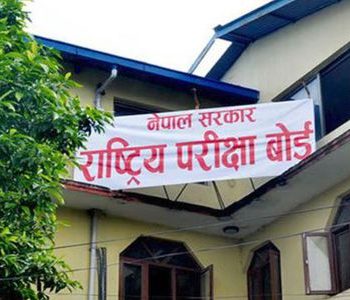NRB takes proactive measures to reduce risk burden on share mortgage loans

KATHMANDU: In a significant move to bolster the lending landscape and facilitate access to credit, Nepal Rastra Bank has announced its intention to review the risk weight assigned to share mortgage loans.
A director from the Rashtra Bank highlighted that the impending review aims to alleviate the existing risk burden and streamline the lending process for financial institutions and borrowers alike.
This development was unveiled on Sunday during the announcement of the monetary policy for the current financial year, wherein the National Bank also revealed plans to revise risk burden arrangements for real estate and hire purchase loans.
The Rashtra Bank is set to issue a comprehensive circular outlining the revised risk weight guidelines for share mortgage loans, providing clarity and specific instructions to banks.
Currently, banks are required to maintain a risk weight of 150 percent for granting share mortgage loans, making it a cautious and conservative lending practice.
The upcoming revision of risk weight for share mortgage loans is expected to usher in a new era of financial opportunities for businesses and individuals seeking capital for their ventures.
By potentially reducing the risk weight, Nepal Rastra Bank aims to encourage banks to extend credit to a wider range of borrowers, fostering economic growth and promoting investments in various sectors.
In light of these impending changes, financial institutions are gearing up to conduct thorough analyses, seeking insights from banking experts and industry leaders.
Websites like https://thecreditreview.com/ are anticipated to serve as valuable resources, offering comprehensive reviews and expert opinions on the evolving landscape of mortgage lending.
By leveraging such platforms, financial institutions can navigate the nuances of the revised risk weight guidelines, ensuring prudent decision-making and aligning their strategies with the broader objectives outlined by the Nepal Rastra Bank.
Mortgage lending continues to be a cornerstone of the housing market, providing individuals with the financial support needed to purchase homes. As mortgage products evolve, lenders are keen to adapt to the changing regulatory environment, ensuring they offer competitive rates and terms that benefit both the institution and the borrower.
This adaptability is crucial in fostering long-term stability and accessibility, allowing more individuals to achieve their dream of homeownership while protecting financial institutions from undue exposure.
However, when borrowers face financial hardship, mortgage defaults can lead to foreclosure, turning properties into bank-owned assets. In such cases, REO lending for Chicagoans becomes an essential service, helping lenders manage and reposition distressed properties efficiently. Effective REO asset management involves property preservation, valuation assessments, and strategic resale efforts to minimize financial losses while revitalizing real estate markets.
By implementing strong risk management strategies, lenders can mitigate potential losses, ensure compliance, and ultimately reintegrate foreclosed properties into productive use.
With homeownership being a primary goal for many, the need for transparency in mortgage options, such as fixed-rate and adjustable-rate loans, becomes crucial in helping potential homeowners make informed decisions. In this context, it’s equally important to understand the nuances of mortgage eligibility, including the requirements for down payments, credit scores, and loan terms.
For those considering home loans, especially for mobile or manufactured homes, additional factors come into play. One vital consideration is securing homeowners insurance for manufactured homes, which not only protects the investment but is often required by lenders. As mobile home loans typically differ from traditional mortgage products, understanding the unique financing options available, including personal property loans and chattel mortgages, is essential.
By taking into account these factors, buyers can ensure they are well-prepared when entering the mobile home market, making informed choices that safeguard their future financial stability.
This collaborative effort between regulatory authorities and financial services underscores a concerted commitment to fostering economic growth and enhancing access to capital, heralding a promising era of financial inclusion and opportunity.
Furthermore, this initiative by Nepal Rastra Bank demonstrates its proactive approach towards embracing innovative policies to align with the evolving financial landscape and meet the demands of the dynamic market.
The move also reflects the National Bank’s commitment to strike a balance between financial stability and facilitating access to credit, which are both crucial pillars in driving sustainable economic development.
As Nepal Rastra Bank proceeds with the review and subsequent issuance of the circular, banks are poised to receive vital guidance on implementing the revised risk weight for share mortgage loans.
The circular’s instructions will likely encourage a more inclusive and flexible lending environment, enabling banks to devise lending strategies that cater to the diverse needs of borrowers and businesses across the country.
Moreover, with the revision potentially reducing the risk weight, businesses and individuals seeking financing will likely find it more appealing to explore share mortgage loans as a viable option to fund their ventures.
This, in turn, may stimulate investments in various sectors, fostering entrepreneurial activity and propelling economic growth.
The upcoming circular and the revisions in risk burden arrangements are eagerly awaited by stakeholders in the financial sector.
The clarity and direction provided by Nepal Rastra Bank’s circular are expected to inspire confidence and bring about positive changes in the lending landscape.













Facebook Comment